
Despite being a public facility, the hospital is owned by the council and run by Waitaki District Health Services Ltd (WDHSL). Being disconnected from the national health system has led to clinical and financial instability during recent years.
Late last month, councillors made the decision in a public excluded meeting to enter negotiations with Health New Zealand Te Whatu Ora (HNZ) to potentially return operations. It was announced to the public yesterday.
WDHSL joint interim chief executive Hugh Kettlewell said time was of the essence, as they planned to have an offer ready for councillors soon.
If all went well, it could change hands by next financial year, he said.
There were a few points WDHSL would be sticking to during negotiations, most importantly that staff, staffing levels and health services not be adversely affected.
"I don’t see us moving from this at all."
The decision made by councillors was "fantastic" and an HNZ-run hospital would be more reliable, Mr Kettlewell said.
Last year, the hospital closed its emergency department three times due to staff shortages.
The hospital had been able to stabilise nursing staff numbers by achieving pay parity last year, but getting doctors was a big problem.
If a doctor did want to come here, there were a lot of processes to go through, such as being licensed to practice if they were from overseas.
He did not expect the hospital to have a full roster if HNZ took control, as that was a national problem, but it would make it easier.
It would also be easier to move staff between hospitals.
While he understood some people were apprehensive about the council returning it to the government, the HNZ model was "absolutely different" to what was used previously.
Back in the 1990s under a National government, the hospital was run by Crown Health Enterprises like a business, he said.
It had wanted to shut Oamaru’s hospital down, before the council offered to take over.
The council had done a fantastic job running it. But now that model was outdated and the HNZ model of providing health at a national level was "exactly the right thing to do".
He asked people to be open to the opportunity.
Waitaki Mayor Gary Kircher said ratepayers "should not be paying twice for its hospital, through general taxation and rates".
Ensuring the hospital remained in Oamaru was the council’s priority and the initial discussions with HNZ had been encouraging.
"These negotiations start from the critical position of maintaining a hospital and health services in Oamaru, for the Waitaki district."
HNZ South Island local commissioning group manager Aroha Metcalf said it wanted to make sure that people living in rural communities had the services they needed to live long and healthy lives supported by a health system that met their needs.
"We wish to develop a joint transition programme with the council on how the day-to-day operations of the hospital could be shifted to Health NZ."
The council also commissioned a review to consider options for the future sustainability of health services in Waitaki.












